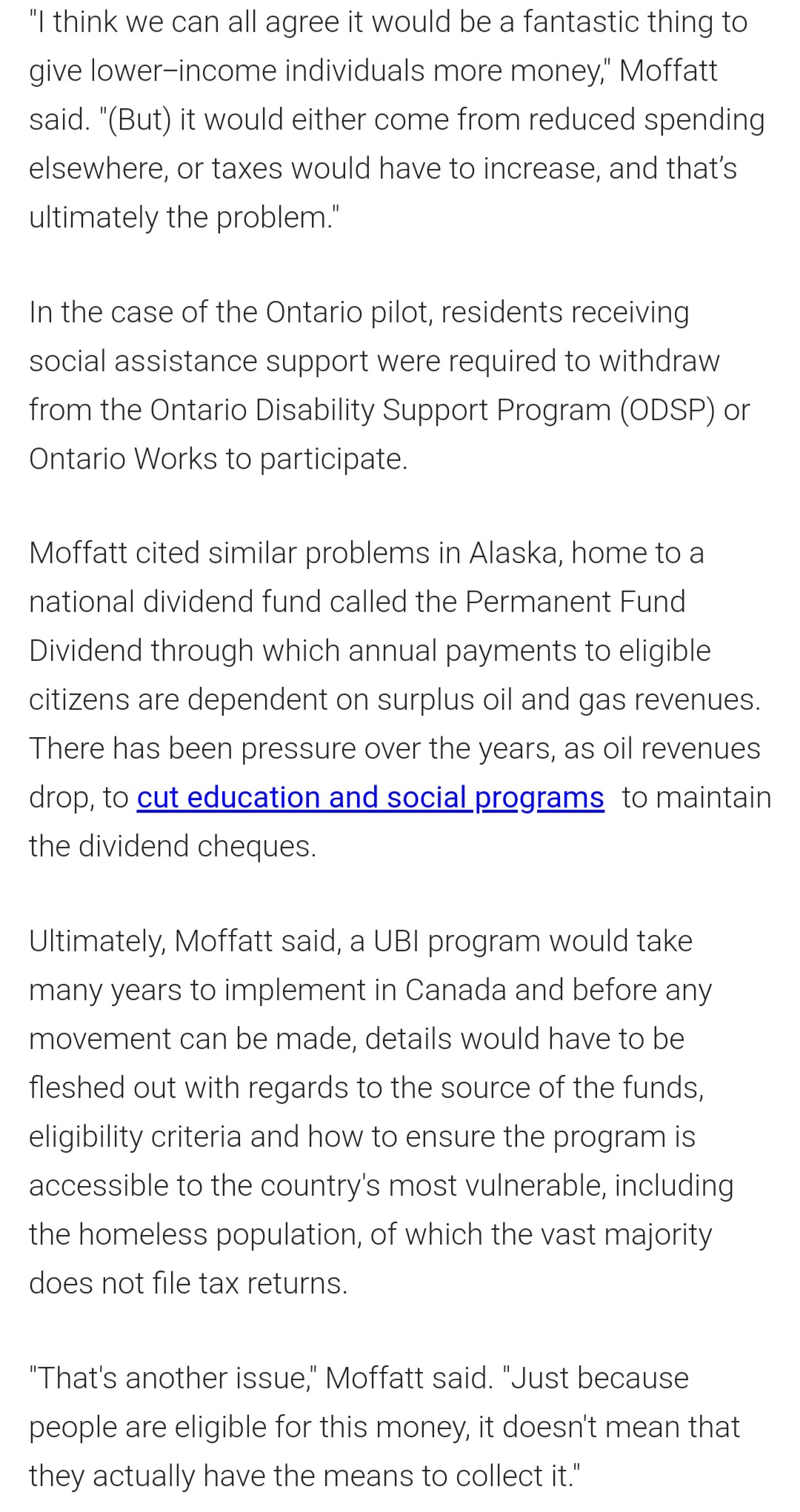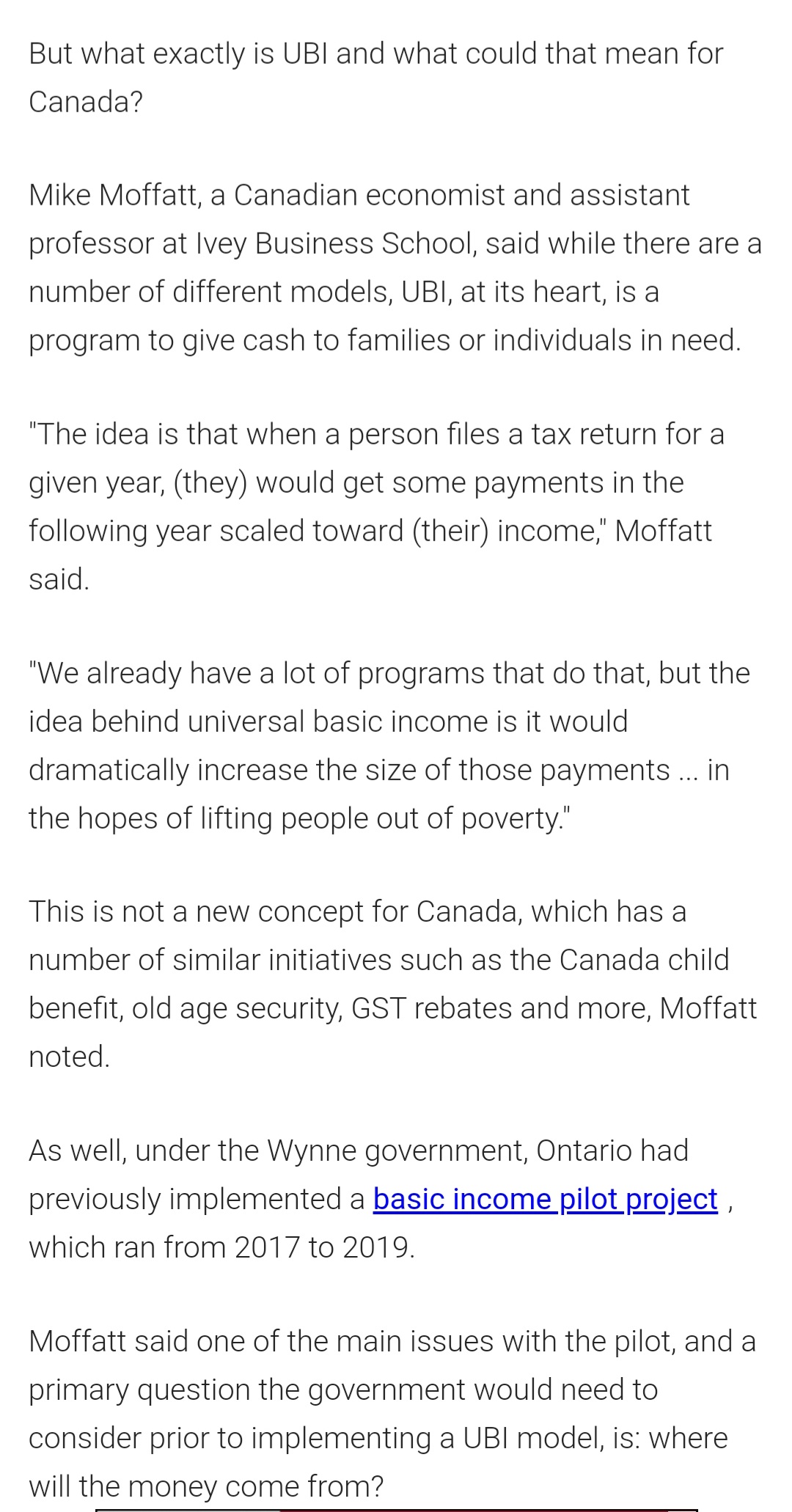Microeconomics: Principles & Policy
14th Edition
ISBN:9781337794992
Author:William J. Baumol, Alan S. Blinder, John L. Solow
Publisher:William J. Baumol, Alan S. Blinder, John L. Solow
Chapter17: Taxation And Resource Allocation
Section: Chapter Questions
Problem 2DQ
Related questions
Question
Find one positive or one normative statement. Explain how you know they
are either a positive or normative statement.

Transcribed Image Text:"I think we can all agree it would be a fantastic thing to
give lower-income individuals more money," Moffatt
said. "(But) it would either come from reduced spending
elsewhere, or taxes would have to increase, and that's
ultimately the problem."
In the case of the Ontario pilot, residents receiving
social assistance support were required to withdraw
from the Ontario Disability Support Program (ODSP) or
Ontario Works to participate.
Moffatt cited similar problems in Alaska, home to a
national dividend fund called the Permanent Fund
Dividend through which annual payments to eligible
citizens are dependent on surplus oil and gas revenues.
There has been pressure over the years, as oil revenues
drop, to cut education and social programs to maintain
the dividend cheques.
Ultimately, Moffatt said, a UBI program would take
many years to implement in Canada and before any
movement can be made, details would have to be
fleshed out with regards to the source of the funds,
eligibility criteria and how to ensure the program is
accessible to the country's most vulnerable, including
the homeless population, of which the vast majority
does not file tax returns.
"That's another issue," Moffatt said. "Just because
people are eligible for this money, it doesn't mean that
they actually have the means to collect it."

Transcribed Image Text:But what exactly is UBI and what could that mean for
Canada?
Mike Moffatt, a Canadian economist and assistant
professor at Ivey Business School, said while there are a
number of different models, UBI, at its heart, is a
program to give cash to families or individuals in need.
"The idea is that when a person files a tax return for a
given year, (they) would get some payments in the
following year scaled toward (their) income," Moffatt
said.
"We already have a lot of programs that do that, but the
idea behind universal basic income is it would
dramatically increase the size of those payments .. in
the hopes of lifting people out of poverty."
This is not a new concept for Canada, which has a
number of similar initiatives such as the Canada child
benefit, old age security, GST rebates and more, Moffatt
noted.
As well, under the Wynne government, Ontario had
previously implemented a basic income pilot project ,
which ran from 2017 to 2019.
Moffatt said one of the main issues with the pilot, and a
primary question the government would need to
consider prior to implementing a UBI model, is: where
will the money come from?
Expert Solution
This question has been solved!
Explore an expertly crafted, step-by-step solution for a thorough understanding of key concepts.
Step by step
Solved in 2 steps

Knowledge Booster
Learn more about
Need a deep-dive on the concept behind this application? Look no further. Learn more about this topic, economics and related others by exploring similar questions and additional content below.Recommended textbooks for you

Microeconomics: Principles & Policy
Economics
ISBN:
9781337794992
Author:
William J. Baumol, Alan S. Blinder, John L. Solow
Publisher:
Cengage Learning

Principles of Macroeconomics (MindTap Course List)
Economics
ISBN:
9781305971509
Author:
N. Gregory Mankiw
Publisher:
Cengage Learning

Economics (MindTap Course List)
Economics
ISBN:
9781337617383
Author:
Roger A. Arnold
Publisher:
Cengage Learning

Microeconomics: Principles & Policy
Economics
ISBN:
9781337794992
Author:
William J. Baumol, Alan S. Blinder, John L. Solow
Publisher:
Cengage Learning

Principles of Macroeconomics (MindTap Course List)
Economics
ISBN:
9781305971509
Author:
N. Gregory Mankiw
Publisher:
Cengage Learning

Economics (MindTap Course List)
Economics
ISBN:
9781337617383
Author:
Roger A. Arnold
Publisher:
Cengage Learning
